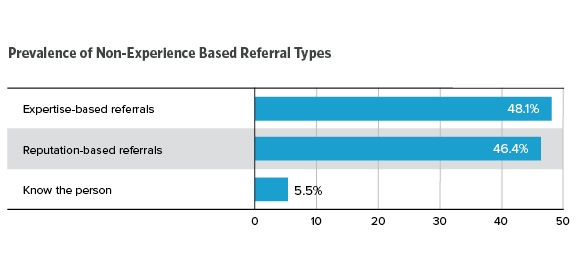Across the world of professional services, countless firms are missing out on opportunities for new business – even though 72.1% of firms identify attracting and developing new business as their top business challenge in 2015.
The reason? An incomplete approach to referrals.
Traditionally, referrals have been at the heart of many firms’ marketing strategies. Our previous research found that increasing referrals was the top marketing initiative for professional services firms in 2015. But as the marketplace evolves, we wanted to look deeper. How and why are non-clients making referrals today? And how can providers avoid being ruled out by a referred prospect before closing the sale?

We wanted to find the answers, so we got down to research. The Hinge Research Institute surveyed 523 professional services firms in the accounting and finance, technology, management consulting, marketing and communications, legal, and architecture, engineering, and construction industries. The vast majority of respondents held decision-making positions at these firms. Now we’ve analyzed the results and published our findings in a new free research report, Referral Marketing for Professional Services Firms.
So what did we find, and how can it help firms adopt a more effective referral marketing strategy?
Underutilized Referrals
When many firms think of referrals, they think of recommendations from clients based on a job well done. That is an important referral type, but it’s not the only one. In fact, there are three major types of referrals:
- Reputation-based referrals
Referrals made by organizations that don’t know a firm by direct experience, but can speak to their knowledge and abilities by reputation in the marketplace. - Expertise-based referrals
These referrals are based on a firm’s specialized expertise, recommending a provider based on their ability to tackle a specific challenge – even if the referrer lacks extensive knowledge of the firm’s reputation. - Experience-based referrals
These are referrals that many firms are accustomed to generating – recommendations based on direct experience working with a given firm.
Too many firms focus only on generating experience-based referrals – missing out on the opportunities afforded by the other two types. And how common are those referrals based on factors other than direct experience?
SEE ALSO: What’s in a Referral? Our New Research Survey on Non-Client Referrals
Much more common than you might think. Our new research for Referral Marketing for Professional Services Firms shows that 81.5% of firms have received a referral from someone who wasn’t a client.
Even more revealingly, we asked these respondents how they knew about the firms they referred and categorized their responses based on referral type. This analysis uncovered a striking breakdown of referral types:

Expertise-based referrals were actually the most common, followed closely by reputation-based referrals.
In the full report, we break down the most common sources of expertise and reputation-based referrals. For expertise-based referrals, the three most common channels through which referrers encountered a service provider’s expertise were:
- Speaking engagements (30%)
- Articles or blog posts (20%)
- Social media interactions (17%)
Our research makes it clear that the same platforms by which one can most effectively build a profile as a Visible ExpertSM – social media, websites, and industry speaking events among others – are essential for generating referrals based on expertise.
How to Avoid Being Ruled Out
Another urgent issue we address in this report is the challenge of being ruled out at an early stage once you’ve been referred – before you can speak to the buyer directly and close the deal. In these cases, the effort put in to generating a referral essentially goes to waste.
And these cases are quite common: 51.9% of our respondents have ruled out referrals before speaking with the firm in question. The reasons are many and varied, and we break them down in-depth in the full report. But there is a notable trend in the responses worth calling out – reasons associated with a firm’s web presence come up again and again. Reasons for ruling out referrals include:
- Their website was unimpressive (29.63%)
- Poor quality content (23.46%)
- They didn’t show up when I searched online (15.64%)
Our previous research has shown that more than 80% of buyers look at a firm’s website to evaluate them, so it’s not a surprise that many firms are being ruled out on the basis of lackluster web presences. In order to generate referrals and close the sale, it’s clear that firms must focus on building their reputations online.
The Full Story
In order to get the complete story, download the free full research report, Referral Marketing for Professional Services Firms.
The report is packed with detail on how and why non-clients make referrals – and how professional services providers can either encourage those referrals or ultimately lose the sale by getting ruled out at an early stage. With the findings in this report, you can not only stop missing out on referral opportunities, but also maximize your efforts to generate new business.
On Google+ or LinkedIn? Follow us +HingeMarketing and join us on LinkedIn.

